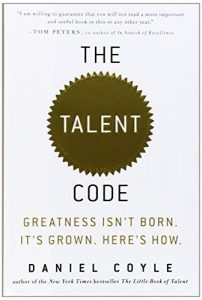
Code new skill in your body by increasing myelin in your brain
We all have connected fibres called “circuits” in our brain. Everything we think and do is a result of electrical impulses travelling through our nerve fibres. These circuits are wrapped in a substance called myelin.
It insulates these circuits and determines how quickly and accurately an impulse can travel along a circuit. A thicker layer of myelin produces quicker electrical impulses corresponding to greater performance. More myelin the better.
How you can grow myelin
Practice makes perfect for this very reason. Make mistakes. It’s part of the process. When you make mistakes, new nerve circuits are fired which causes a thickening of myelin around them.
Nature vs Nurture
Skill and talent cannot always be attributed to genetics. Consider the environment in which a person is raised as well.
Throughout history, talents have usually emerged in large groups, during a particular place and time. Eg: a Large number of great artists rose in Renaissance Florence during the 15th century. In Renaissance Florence, there was a culture of teaching boys a craft from a very young age. The author calls this Deep Practice.
Break skills into smaller parts
Splitting a task into smaller pieces is critical to deep learning.
Raise the bar
Learning and deep practising a skill requires a lot of time and repetition. For training to be effective, you have to constantly raise the difficulty while practising.
# Key Takeaways:
– Talent is not innate, but rather a result of deep practice, ignition, and master coaching.
– Deep practice involves breaking down skills into small, repetitive actions and constantly pushing oneself to improve.
– Ignition is the motivation and passion that drives individuals to pursue deep practice.
– Master coaching involves providing specific and targeted feedback to help individuals improve.
– Myelin, a substance in the brain, plays a crucial role in developing talent through deep practice.
# Practical Application:
– Individuals can apply the concept of deep practice by breaking down skills into smaller, manageable actions and constantly pushing themselves to improve.
– Ignition can be fostered by finding one’s passion and setting goals to pursue it.
– Master coaching can be implemented by providing specific and targeted feedback to individuals, whether in a professional or personal setting.
– Understanding the role of myelin in talent development can help individuals focus on deliberate and intentional practice to improve their skills.
# Valuable Insights for Leaders and Managers:
– Chapter 4, “The Three Rules of Deep Practice,” offers valuable insights on how to break down skills and create a practice routine for continuous improvement.
– Chapter 5, “The Sweet Spot,” discusses the importance of finding the right balance between challenge and skill level for optimal learning.
– Chapter 6, “Priming the Pump,” explores the role of ignition and how leaders can create a culture that fosters passion and motivation in their team.
# Effective Case Studies and Examples:
– The story of Brazilian soccer players and their intense deep practice routine in Chapter 2 illustrates the power of deliberate practice in developing talent.
– The example of the Bronte sisters and their writing practice in Chapter 3 showcases the importance of deep practice and myelin in mastering a skill.
– The case study of the KIPP Academy in Chapter 7 demonstrates the impact of master coaching and deliberate practice in achieving success in education.
Leave a Reply